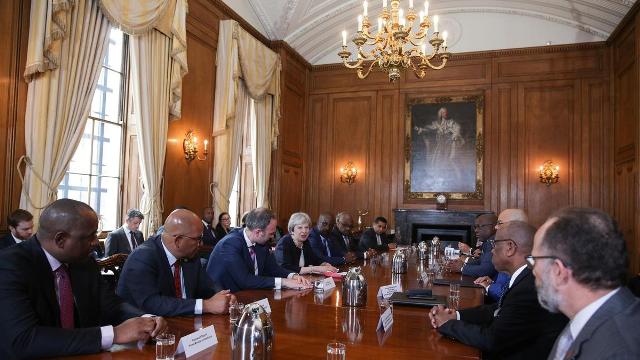 The 2018 Commonwealth Heads of Government Meeting (CHOGM) was
substantially overshadowed by the Windrush scandal. [photo: Caricom.org]
The 2018 Commonwealth Heads of Government Meeting (CHOGM) was
substantially overshadowed by the Windrush scandal. [photo: Caricom.org]
[This is an excerpt from an article which appeared in the June 2018 edition of The Round Table: The Commonwealth Journal of International Affairs.]
The 2018 [Commonwealth Heads of Government] meeting is just the most recent of a whole series of Commonwealth summits where British government policy has come under the spotlight. Indeed, the events over the last few weeks demonstrate a key role that that Commonwealth has played successfully since the 1960s: holding the UK to account over various legacies of empire. The Commonwealth, and in particular the biennial heads of government meetings, have regularly provided a forum through which to influence the UK government.
CHOGMs provide proximity and access, as well as publicity through which to apply pressure; and Commonwealth leaders, as well as the Commonwealth secretary general, have consistently used these opportunities effectively.
At the 1971 summit, held in Singapore, African leaders led by Kenneth Kaunda of Zambia and Julius Nyerere of Tanzania threatened to walk out of the meeting over the UK’s sale of arms to South Africa. In press conferences and newspaper articles on the summit sidelines, as well as in the closed conference sessions, huge pressure was heaped on the UK’s Ted Heath. Heath’s experience at the CHOGM was described in the press as a ‘ducking’, and a cartoon in the British newspaper The People pictured him, armed with a cricket bat, furiously hitting back at balls slung at him by various African leaders. At the 1979 Lusaka CHOGM, a concerted campaign from many Commonwealth leaders, led by Kaunda and Nyerere as well as Commonwealth Secretary-General Sonny Ramphal, contributed to the UK government’s decision to hold talks on the future of Rhodesia/Zimbabwe. At multiple meetings from the 1960s onwards, Commonwealth summits were used to apply pressure on the British government over its relationship with apartheid South Africa.
The latest CHOGM has demonstrated the continuing value of the Commonwealth for holding Britain to account. This role is not always an easy one for the Commonwealth to own. Such a vision for the organisation once again highlights the UK and the colonial past, something of an anachronism for an organisation trying to carve out a new role and identity. But to overlook its valuable role in these areas in a bid to shed outdated views of the Commonwealth as a colonial hangover is to overlook some of the Commonwealth’s key successes.
While many might be tempted to see the British Empire as a thing of the past, the Windrush scandal demonstrates the ongoing impacts of colonial policies, histories and ideologies in the present day.
While these legacies remain, the Commonwealth will continue to have this valuable role to play.
Dr Ruth Craggs is Senior Lecturer in Human Geography at King’s College, London and a member of the Round Table Editorial Board.



